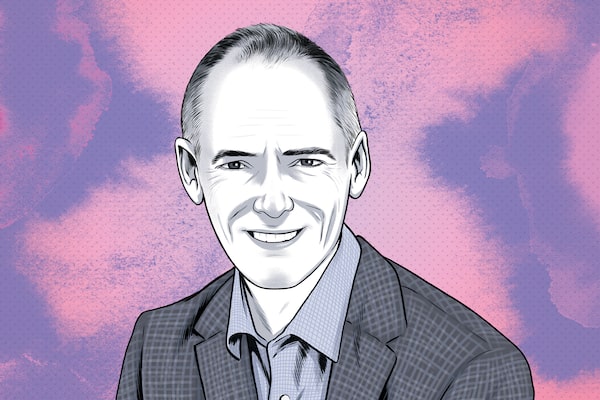
Steven Palmer of AlphaNorth Asset Management.The Globe and Mail
Sign up for the Globe Advisor weekly newsletter for professional financial advisors on our sign-up page. Get exclusive investment industry news and insights, the week’s top headlines, and what you and your clients need to know. For more from Globe Advisor, visit our homepage.
It’s been a tough year for small-cap investors like Steven Palmer, president and chief investment officer at AlphaNorth Asset Management in Toronto.
His AlphaNorth Partners Fund is down by about 14 per cent over the past 12 months as of Sept. 30. But Mr. Palmer believes the drop creates an opportunity for long-term investors to buy higher-quality small caps at discount prices.
“[The market] will turn, and when it does, the returns are usually dramatic,” he says. “Small caps are higher risk, but also higher reward. If you take a longer-term approach, you can do very well.”
His fund has seen an annualized return of 5.3 per cent over the past five years. Mr. Palmer says that compares to an annualized drop of 4.7 per cent for the benchmark S&P/TSX Venture Exchange over the same five-year period. The performance is based on total returns and net of fees as of Sept. 30. Mr. Palmer declined to provide the value of his assets under management.
The Globe and Mail spoke recently with Mr. Palmer about what he’s been buying and selling and a stock he wished he owned.
Describe your investing style.
We focus on early-stage micro- and small-cap companies diversified across all sectors. Typically, we have a growth bias. We try to get into a stock early and make multiples on our money. We take a longer-term approach.
Are you holding cash in your fund right now?
Typically, we don’t hold cash. It’s more difficult to liquidate positions in the small-cap market because they don’t trade as often as large caps. If we’re negative on the market, we’ll try to raise a little bit of cash, but it wouldn’t be significant. We also utilize bear ETFs (exchange-traded funds) and do some stock-specific shorting from time to time. We’re long right now because I’m pretty bullish going forward.
What’s your take on the current market environment?
Our view is that the equity market bottomed in October last year. Investor sentiment was at an extreme low then, even worse than during the 2008 global financial crisis in some cases. That was unjustified, in my view. The choppiness we’ve seen in September and so far in October is typical for this time of year. There’s typically a period of seasonable strength for small caps in December, January and February, which we expect to see again later this year and early into 2024.
How have you been investing as a result?
We don’t trade as much when markets are doing badly as they are now. Typically, there’s more volume when markets are doing well, and you can take money off the table from companies that have generated a nice profit and then reinvest it in something else. We’ve been cleaning up the portfolio a little bit lately and adding to some of our higher conviction names.
What have you been buying?
We recently added to our position in biotech company Delcath Systems Inc. DCTH-Q, a stock we’ve owned for a couple of years. The U.S. Food and Drug Administration recently approved Delcath’s liver cancer treatment kit. That triggered the exercise of warrants, which brought US$35-million into the company. We used that liquidity to reduce our position. The stock dropped after that, and we used it as an opportunity to buy more. In our view, the company is now derisked and has all the cash it needs to commercialize its treatment. We don’t believe the current share price reflects that.
We’ve also been adding to our position in cleantech company Char Technologies Ltd. YES-X, which converts wood materials and organic waste into renewable gases and biocarbon. It has received $13-million in government grants to help build its facility. In July, it announced the closing of a $6.6-million strategic investment by steel and mining giant ArcelorMittal SA.
We’ve also been buying Collective Mining Ltd. CNL-T, a gold explorer in Colombia. We’ve owned a little bit of the stock but increased our position significantly on the pullback in September. Gold and gold equities have declined in recent weeks. Collective Mining’s management team has been highly successful, selling its previous Colombian gold company, Continental Gold Inc., for $1.4-billion in 2020. We view Collective Mining as a top-quality emerging junior gold company quickly building a substantial resource.
What have you been selling?
We recently sold our shares in artificial intelligence company Verses AI Inc. VERS-NE. We bought it when it was private. It went public in the summer of 2022 and has performed very well on the back of all the recent AI hype. We sold this past spring for a nice profit. We’ve also sold some of our junior mining companies that weren’t performing well.
Name a stock you wished you bought.
Tenaz Energy Corp. TNZ-T is a company we’ve looked at for a while. It’s a traditional energy company with producing assets in Europe. Part of its strategy is to grow through acquisitions. I assumed the company would have to raise money to execute that strategy – and that we could participate in a private placement – so, I didn’t buy any in the market. It turned out to be the wrong call because they made an acquisition, which was the catalyst for the stock to go a lot higher. So, we missed that one.
This interview has been edited and condensed.
For more from Globe Advisor, visit our homepage.